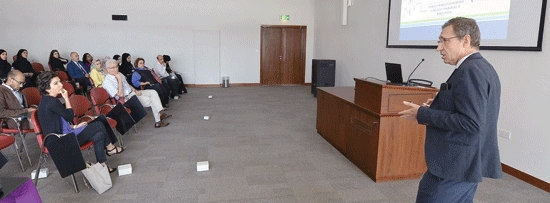

Doha: The College of Medicine at Qatar University (CMED-QU) yesterday held an awareness event on the Alzheimer’s (ALZ) disorder to commemorate World Alzheimer’s Day, and as part of its ongoing outreach activities that address health concerns within the community.
The event was themed Alzheimer’s Purple Day and invited QU students, faculty and staff and members of the wider community to wear purple to recognise people suffering with the disease, to learn about its causes and symptoms, and the toll it takes on families.
The event included a film screening, open discussion and a visual learning experience about ALZ. A presentation by Hamad Medical Corporation (HMC) Head of Neurology and Neurophysiology Dr Dirk Deleu, aimed at promoting awareness about Alzheimer’s dementia and to boost support in the fight against the global widespread disorder. He said: “Dementia is common in elderly but is not an inherent part of aging. Alzheimer’s dementia is the most common type of dementia and there is no curative therapy at this time.”
Comparing normal cognitive lapses and dementia, Dr Deleu noted that the former gave indications of everyday forgetfulness such as not remembering names and dates and misplacing keys, while the latter produces signs such as not recognizing family members, getting lost in normally familiar places, and forgetting one’s name.
He added that ALZ sufferers need special care and attention from their families and caregivers. “We are all encouraged to increase our awareness of Alzheimer’s to learn about its symptoms and the most appropriate prevention methods”, he said.
Dr Deleu went on to highlight the situation of ALZ dementia in Qatar for which he noted there were no formal studies conducted on its prevalence: “In less than four decades, it may have a significant impact on Qatar’s elderly population. Due to Qatar’s population growth, we expect an increase by 30 times of ALZ sufferers by 2050. This calls for effective efforts to help reduce this number. Cognitive enhancement, individual and group therapy, regular medical checkups, and communication with family and caregivers are very efficient ways to minimize and control symptoms of ALZ dementia.”
The Peninsula




